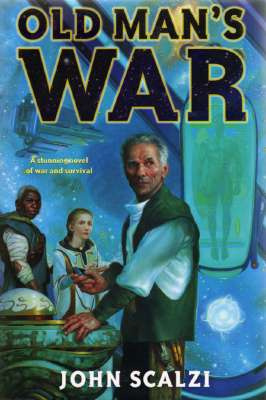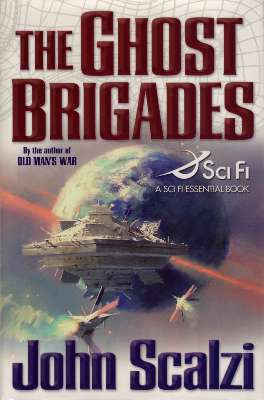

| John Scalzi is the well-known author of the weblog Whatever. | ||
| Click on a book's image or title to order from Amazon.com |

Old Man's War
Tor, HC, © 2005, 313 pp, ISBN #0-765-30940-8Reviewed June 2005
In Old Man's War, Scalzi wears his influence on his sleeve, thanking Robert A. Heinlein for his body of work. Old Man's War is not just a direct descendant of Starship Troopers, though; it's also a clear cousin to Joe Haldeman's The Forever War (which Scalzi tells me he has not read).
In the book, Earth is a relatively isolated world in the galaxy, kept that way by humanity's Colonial Defense Forces. Humans on Earth don't know what the universe is really like, and are mostly happy to keep it that way. However, once they turn 75, humans can join the CDF and enlist as soldiers. This is what our hero, John Perry, does.
The journey from Earth is relatively calm and Perry makes several friends among his fellow emigrees. But the fun really starts when Perry learns the secret to how his aging self will be made combat-ready, he and his fellows go through basic training, and they learn the real secret to the galaxy: There are hundreds of races competing with humanity to habitable worlds, most are decidedly hostile to humans (and to each other), and humanity is fighting a constant war to gain new worlds to colonize, and to protect those colonies from attack. Perry rises through the ranks of the CDF as he experiences more and more of what the galaxy has to offer, suffers personal losses, but makes some interesting discoveries as well.
I personally am not really a fan of Heinlein's work, but I do think that Starship Troopers is his best book, both because it's the most exciting and the most thought-provoking (well, without provoking thoughts that make you want to go take a shower, as some of his later books do). But while Old Man's War shares with that book the fast pace and hard-fighting backdrop, it's not a vehicle for social theory that Starship Troopers was. Instead, it shares its themes with The Forever War, particularly the themes of leaving home and becoming isolates from everything you knew due to distances of time and space. But Haldeman's novel is about young soldiers seeing the lives of their friends and family passing before their eyes, while Old Man's War starts at the end, where Perry says his goodbyes to his friends and family, going with full knowledge that he won't see them again - since after all he wouldn't see them if he stayed on Earth and passed away. The tone therefore is one of snatching new life out of impending tragedy, rather than the "war is hell, in ways you can't even imagine" tone of The Forever War.
Perry is a character right in the mold of the Heinlein/H. Beam Piper "self-reliant men": Quick with a witty remark, given to lateral thinking, and often in the right place at the right time. But the book is largely an adventure novel, so the fact that Perry seems a little smarter than most of those around him doesn't so much strain credulity as it lends additional wit and entertainment to the story.
Scalzi's got a talent for keeping the story moving while still injecting some fun ideas into the yarn (such as one character's theory of how the FTL "skip drive" works). The hard-driving tone of the novel detracts somewhat from Perry's distress as his friends fall victim to the ongoing wars, and from the emotional turmoil he feels when he develops an unexpected relationship with another character late in the book. Perry seems all too able to take things in stride so that it just seems natural that he ends up coming out on top. (To be fair, this is a pitfall of this whole class of heroic science fiction.)
I think the biggest disappointment with the book is that the early theme of how the elderly bring a unique perspective and talents to fighting a war falls by the wayside about a third of the way through. This happens pretty much of necessity due to CDF technology. It's not a show-killer, but it is a little strange to have this set up as a major theme and then basically cast aside.
Old Man's War should appeal to fans of Heinlein and fast-paced, page-turner adventure stories in general. Despite its flaws, it's worth the trip.

The Ghost Brigades
Tor, HC, © 2006, 317 pp, ISBN #0-765-31502-5Reviewed June 2006
Not so much a sequel to Old Man's War as a novel set in the same universe, The Ghost Brigades is a more mature and rewarding story than its predecessor, and a great ride, too.
Earth's Colonial Defense Forces uncover a plot by three alien species to work together to destroy humanity. Central to this plot is scientist defector Charles Boutin, but what his role is is unclear. Boutin had been a key researcher into the mind transfer technologies used by the CDF to create their armies of superhumans, and it's learned that he created an imprint of his brain on a computer, something thought to be impossible. A clone of Boutin is grown and the imprint is transferred to the clone, but it seems not to take. The clone is then renamed Jared Dirac and assigned to the Special Forces - the "Ghost Brigades" of the title - which consist of cloned bodies with artifically-constructed minds.
Jared goes through integration and training, making friends and finding rivals among the other Special Forces soldiers. He goes on active duty and experiences the life of a soldier. Inevitably, his memories from the Boutin imprint start to surface, placing him in a precarious position inside Special Forces. But with incomplete memories, and not truly knowing what Boutin is planning, Jared embarks on a quest to find out what his "father" is up to, and hopefully avert a war in the process.
The Ghost Brigades moves away from the overly-Heinlein-esque feel of Old Man's War, being able to more widely explore the universe in which that story took place: We're exposed to three different species in some depth, learn something crucial about a fourth, and see the workings of the CDF from the highest levels to the lowest. The universe feels more real, less like a backdrop on which to hang a story about a particular protagonist.
But the novel in fact shines at its portrayal of its own protagonist: Jared may be something of a naive kid (which is something of a cliche in this sort of SF), but he's also smart and clever, he empathizes with his friends and cohorts, and we empathize with him. Although some of Jared's experiences are (perhaps unavoidably) a little too odd for the reader to fully connect with, his essential emotional experiences resonate true: His love for his teammate Sarah Pauling, his rivalry with Steve Seaborg, his attitudes towards Boutin's memories and life experiences, and his own experiences in combat.
The book also excels at portraying its bit characters, the admirals and scientists who surround the creation and life of Jared Dirac. Fleshing out their appearances with entertaining misdirections or amusing social details (such as the General's Mess, where lower-ranked officers may visit, but not eat), they both provide some necessary alternate points-of-view and help round out Jared's world.
At its core, The Ghost Brigades is about family-building. Jared arrives in the world with almost nothing (putting aside his superhuman body and hidden memories of another man's life for a moment), but has to find a place for himself in the world and learn what's important to him. That's where the story is emotionally grounded: Jared earning the respect (and more) of his mates in his squadron, and experiencing the expected traumas and losses in war. Once Boutin's memories start to surface, he experiences Boutin's love for his family, particularly his daughter, and uses that as a hook to try to figure out what Boutin is up to. But it's never just a hook, as Scalzi very effectively shows that Jared really feels what Boutin felt, to the extent that he remembers it.
The story has some nice twists and turns (including the origins and motivations of one of the major alien species), and although some of the twists can be guessed ahead of time, there's some decent misdirection going on. Also some clever technical gimmickry, although never of the "technobabble" sort (although just a touch of "Hey, none of the characters or their predecessors ever thought of this before!" syndrome). Overall the story ties up in a fairly nifty bow, a little bittersweet but still rewarding.
I read this book on my flight to attend WisCon 30 last month, and there I told Scalzi that if he keeps writing a novel a year, he should keep me busy for many WisCons to come. He said he might have two books coming out by next year, and after reading this one, that's not a bad thing.
hits since 13 June 2005.